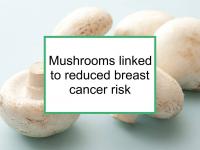Mushroom consumption has been linked to reduced risk of breast cancer in a number of studies. The studies have been conducted primarily in Asians, who tend to have higher mushroom consumption than U.S. women. Drinking green tea has been shown to enhance the chemopreventive effects of mushrooms.
This is another factor that might account for the favorable results found in Asian epidemiological studies. However, it is plausible that mushrooms also have chemopreventive effects in Western populations since they contain numerous compounds with anti-cancer activities, including conjugated linoleic acid (CLA), selenium, various β-glucans and lectins.
Mushrooms also contain compounds that can reduce Cox-2 expression (thereby reducing breast cancer risk), and inhibit lactate dehydrogenase-A (thereby potentially delaying or reducing resistance to paclitaxel chemotherapy). Now a new meta-analysis of studies has concluded that mushroom intake is inversely associated with breast cancer risk.
Established anti-cancer activities of mushrooms
Cell studies have demonstrated that white button mushrooms reduce aromatase activity, the conversion of androgens to estrogens within the body, thereby reducing the risk of estrogen receptor positive (ER+) breast cancer. Reishi mushroom extract has been shown to reduce inflammatory breast cancer (IBC) cell growth and viability without harming normal breast cells. Reishi acts by causing reductions in the expression of key genes involved in cancer cell survival, proliferation, invasion, and metastasis. Animal studies have demonstrated that mushrooms reduce mammary tumor formation.
Mushroom choices for breast cancer
Maitake mushrooms are sold dried or fresh in upscale supermarkets and specialty markets. Maitake mushrooms have been shown to reduce growth, inhibit angiogenesis, and induce apoptosis of human breast cancer cells in the laboratory. However, a 2009 trial of maitake mushroom supplementation in postmenopausal breast cancer survivors found that, contrary to expectations, the maitake extract had both immune enhancing and immune suppressant effects at various doses. Therefore, we would caution breast cancer survivors and those at high risk against consuming maitake mushroom extracts.
Reishi mushrooms are too bitter and tough to be eaten as food, so reishi is normally sold in the form of capsules, liquid extracts, or tea. Reishi extract has been shown to inhibit the adhesion, migration and invasion of hormone receptor negative (ER-/PR-) breast cancer cells. As noted above, reishi extract has also been shown to be effective in inhibiting inflammatory breast cancer progression, one of the few foods to have demonstrated beneficial impact on this form of the disease. However, while reishi mushroom extracts have also been shown to have anti-cancer activities against ER+/PR+ breast cancer cells, they appear to have estrogenic properties so would not be a good choice for women with non-IBC hormone receptor positive disease.
Shiitake mushrooms have become widely available fresh or dried in grocery stores and specialty markets. Shiitake mushrooms have been found to inhibit increases in tumor volume of human breast cancer cells implanted in mice.
White button mushrooms (the common supermarket mushrooms) appear to be a good choice for breast cancer. White button mushrooms have among the most powerful proven breast cancer chemopreventive properties of the mushrooms that have been studied. They have been shown to suppress aromatase activity and estrogen biosynthesis, in addition to inhibiting proliferation of ER+ breast cancer cells. Portobello and crimini mushrooms are closely related to white button mushrooms and may have similar properties. Note that such mushrooms should be thoroughly cleaned and cooked rather than eaten raw.
We would be very cautious about consuming mushroom supplements since safe and effective dosages have not been determined.
Latest research finds mushroom intake is linked to reduced breast cancer risk
The meta-analysis of previous studies referenced at the beginning of this news story was designed to examine the evidence concerning the association between mushroom consumption and breast cancer risk. The authors also sought to quantify the dose-response relationship between mushroom intake and reduction in breast cancer risk. To conduct the study, the authors searched PubMed, Web of Science and Google Scholar for relevant studies up to year-end 2013. Observational studies concerning three or more categories of mushroom intake were eligible. The authors assessed the quality of included studies using the Newcastle-Ottawa Scale. The final analysis included eight case-control studies and two cohort studies incorporating a total of 6,890 breast cancer cases.
Based on their analysis, the authors found a modest 3% reduction in breast cancer risk for each gram per day of mushroom consumption. The authors also evaluated the influence of menopausal status, finding that mushroom consumption was slightly more protective for postmenopausal women than premenopausal women. The authors conclude that mushroom intake may be inversely associated with risk of breast cancer, however the results need to be confirmed with large-scale prospective studies.
